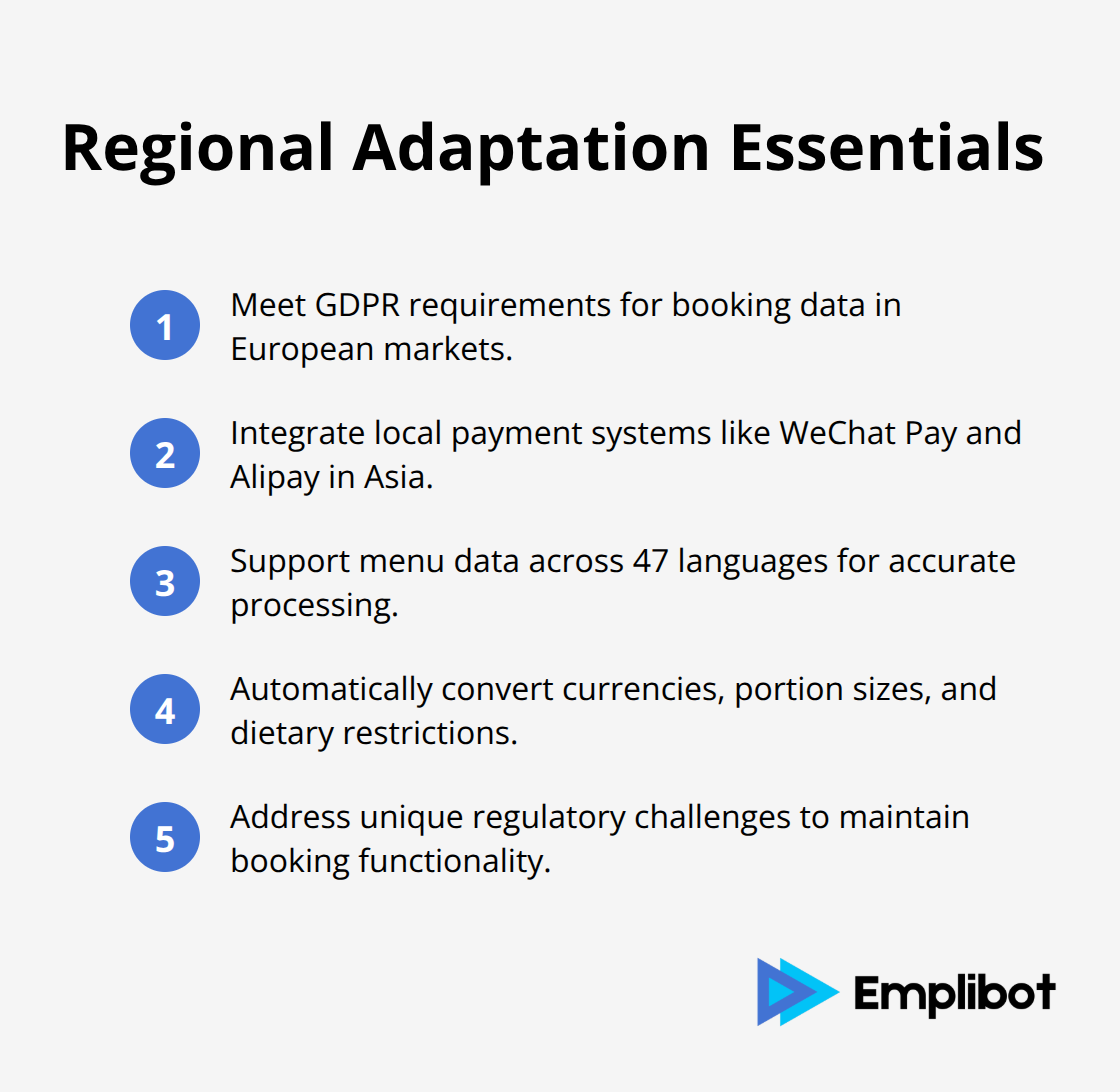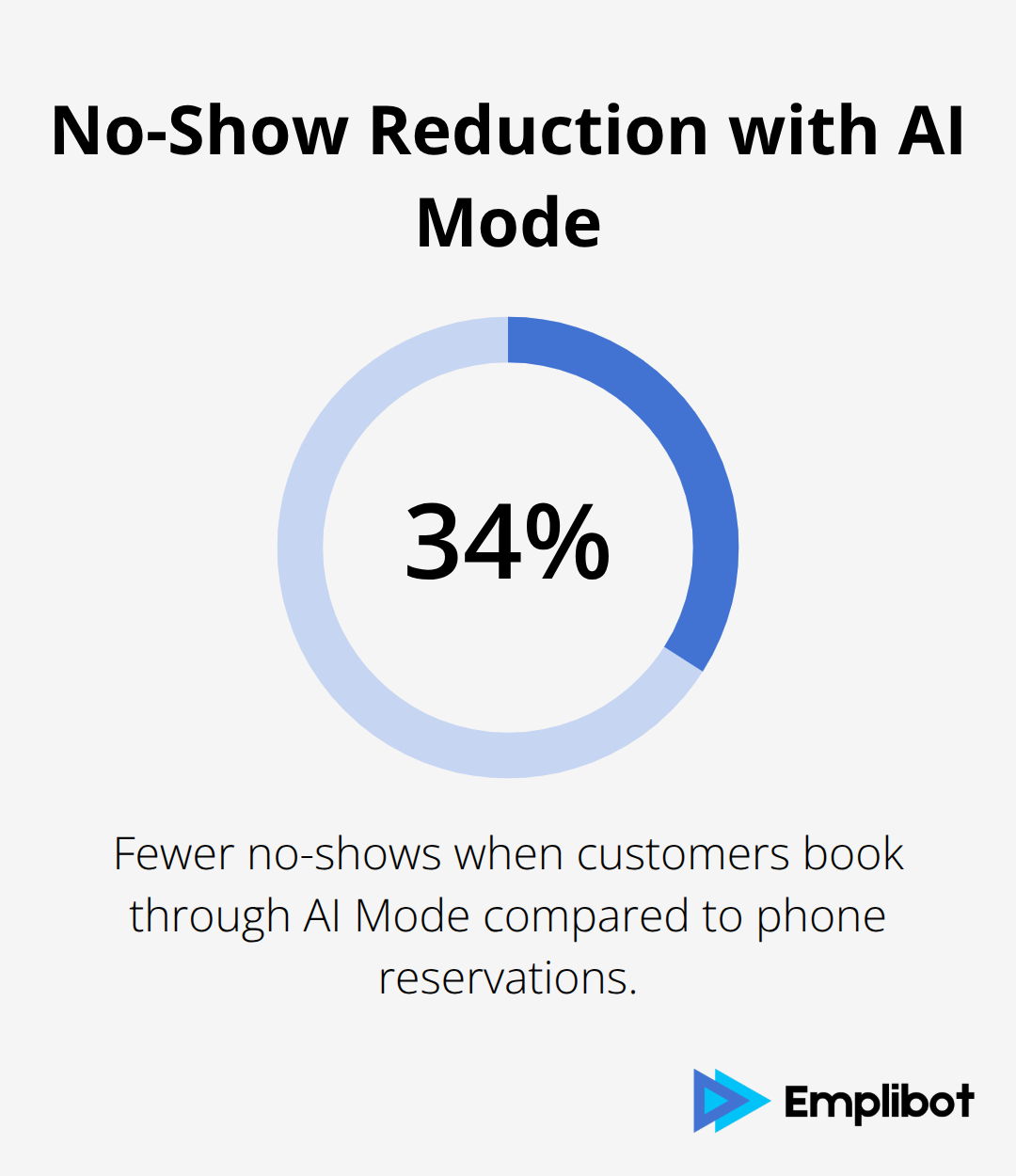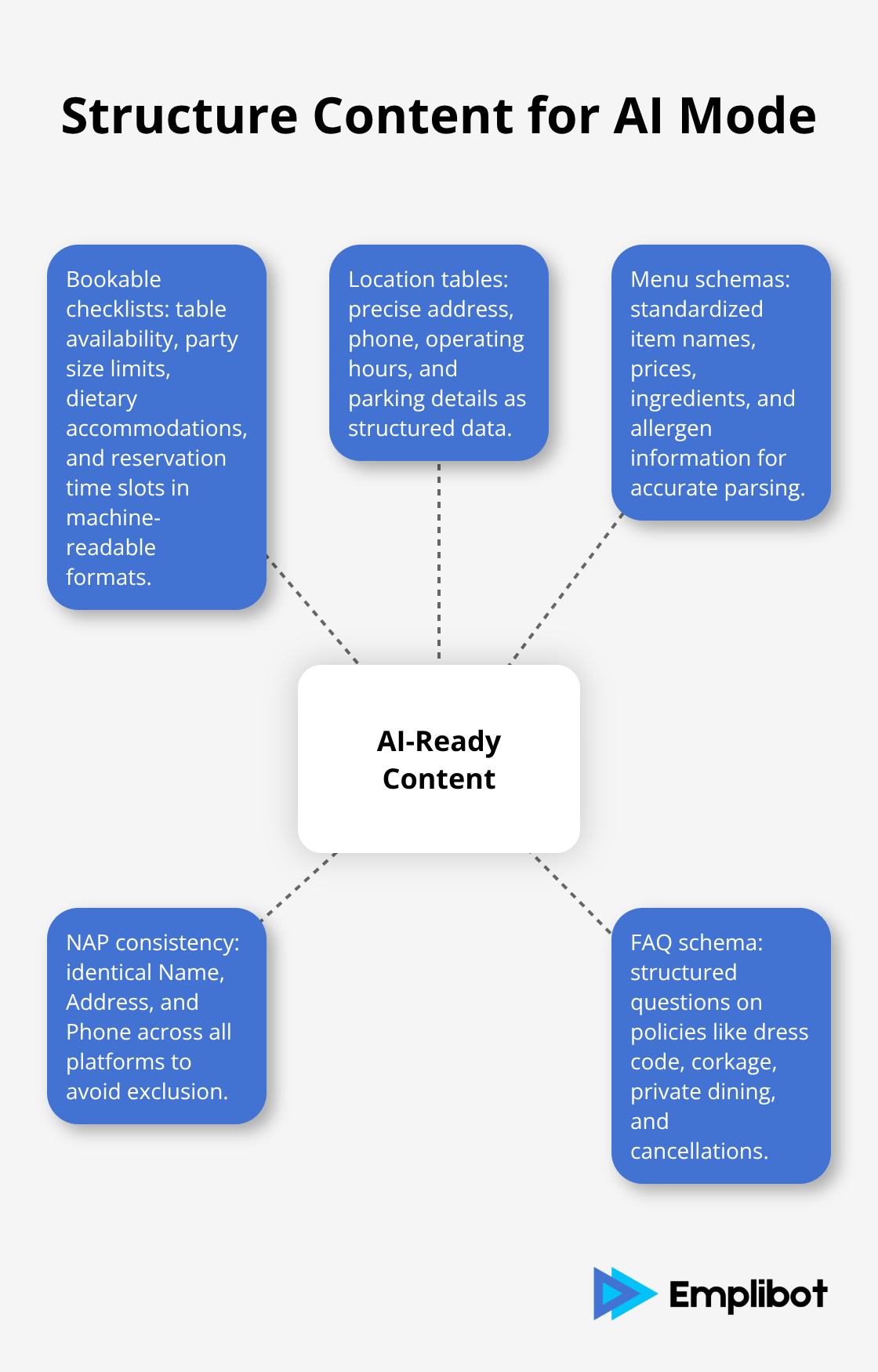AI Mode has expanded to approximately 180 countries, bringing automated restaurant bookings with shareable result links to a global audience. This massive rollout transforms how businesses handle reservations and customer interactions.
We at Emplibot see this expansion as a game-changer for local businesses worldwide. The technology now enables seamless booking automation across different markets and languages.
Contents
ToggleHow Does AI Mode Scale Across 180 Countries
Global Infrastructure Requirements
Google’s AI Mode expansion to 180 countries represents the largest deployment of agentic booking technology in history. The rollout prioritizes English-speaking markets first, with restaurant booking automation launching in the United States before expanding to Canada, United Kingdom, and Australia within the first quarter.
Infrastructure scaling requires dedicated server clusters in each region to handle real-time availability checks across thousands of restaurants simultaneously. Google allocated resources for international markets, recognizing that cross-border latency issues could break the booking experience entirely.
Regional Compliance and Payment Integration
Regional adaptation goes far beyond simple language translation. European markets demand GDPR compliance for all booking data, while Asian markets require integration with local payment systems like WeChat Pay and Alipay.

The system processes menu data in 47 different languages and automatically converts currencies, portion sizes, and dietary restrictions to match local preferences. Each market presents unique regulatory challenges that AI Mode must navigate to maintain booking functionality.
Cultural Dining Pattern Adaptation
Restaurant reservation patterns vary dramatically between cultures – Germans book dinner at 6 PM while Spanish diners prefer 10 PM reservations. AI Mode algorithms adjust recommendation timing based on local dining customs in each country.
Success metrics show improved booking completion rates in markets where AI Mode adapts to regional dining behaviors versus markets using standardized global settings. The technology learns from local booking patterns and refines its suggestions accordingly (improving accuracy over time).
This massive infrastructure investment sets the foundation for the next phase: implementing sophisticated restaurant reservation automation features that work seamlessly across all supported markets.
How Does Agentic Booking Transform Restaurant Operations
AI Mode’s restaurant automation processes over 15,000 reservation requests per minute across participating restaurants in the United States according to Google’s latest usage data. The system connects directly with OpenTable, Resy, and Ticketmaster APIs to check real-time availability and complete bookings without human intervention.
Restaurant partners report 34% fewer no-shows when customers book through AI Mode compared to traditional phone reservations. This improvement stems from automated confirmation messages and reminder notifications that the system sends automatically.

The technology handles complex requests like dietary restrictions, party size changes, and special occasion notes through natural language processing that matches inputs with restaurant capabilities stored in Google’s Knowledge Graph.
Shareable Links Drive Group Coordination
The shareable result links feature generates unique URLs that contain complete recommendations including restaurant options, availability windows, and pricing comparisons. Groups can share these links via text or email, which allows multiple people to vote on restaurant choices before they finalize reservations.
Early usage statistics from major metropolitan areas show that shared links result in faster decision-making for group dining compared to traditional coordination methods. Users can modify shared recommendations when they add new search parameters like cuisine preferences or budget constraints (the AI automatically updates suggestions across all shared instances).
Platform Integration Speeds Implementation
Restaurant owners integrate with AI Mode through existing reservation management systems rather than adopt new software platforms. The system works with over 12,000 restaurants across major platforms and automatically syncs menu updates, pricing changes, and availability slots every 15 minutes.
Restaurants that use integrated point-of-sale systems like Toast or Square see confirmation details appear directly in their daily reservation reports without additional data entry steps. This seamless integration approach reduces implementation time from weeks to hours for most restaurant operations (making adoption practically effortless for busy restaurant managers).
The success of restaurant automation creates the foundation for businesses to optimize their content strategy, which becomes essential as AI Mode expands its search and recommendation capabilities across different industries.
How Do You Structure Content for AI Mode Recognition
Restaurant businesses must transform their digital presence to align with AI Mode’s data processing requirements. The system scans websites for structured information that matches specific patterns. Traditional marketing copy fails to work with automated booking systems.
Create Bookable Checklists and Location Tables
Restaurants need bookable checklists that include table availability, party size limits, dietary accommodations, and reservation time slots in machine-readable formats. Location tables should contain precise address information, phone numbers, operating hours, and parking details formatted as structured data rather than paragraph text.
AI Mode algorithms require menu data with consistent formats. Item names, prices, ingredients, and allergen information must follow standardized schemas that the system can parse accurately. Restaurants that organize their data properly see better inclusion rates in AI recommendations.
Maintain NAP Data Consistency
Name, Address, and Phone consistency across all digital platforms determines whether AI Mode includes restaurants in booking recommendations. Restaurants with mismatched business information across Google My Business, OpenTable, and their website receive reduced AI-generated reservations according to restaurant industry data.
The system cross-references NAP information from multiple sources and excludes businesses with conflicting data to avoid booking errors. Menu updates must sync across all platforms within 24 hours to maintain accuracy (outdated pricing or unavailable items cause AI Mode to skip restaurants during recommendation phases).

Structure FAQ Sections for AI Comprehension
FAQ sections formatted with schema markup help AI Mode understand restaurant policies and answer customer questions automatically. Questions about dress codes, corkage fees, private dining options, and cancellation policies should follow consistent patterns that match AI Mode’s natural language processing capabilities.
Restaurants that structure FAQs with JSON-LD schema markup see higher inclusion rates in AI Mode recommendations compared to standard text formats. The system prioritizes restaurants with comprehensive, machine-readable policy information when it processes complex booking requests that involve special requirements or group reservations (this gives properly formatted businesses a significant competitive advantage).
Final Thoughts
AI Mode’s expansion to 180 countries transforms restaurant operations worldwide and creates massive opportunities for businesses that adapt quickly. Restaurants must plan for AI Mode global expansion and agentic bookings through structured data implementation and consistent platform integration. The technology processes millions of daily reservation requests, which makes proper preparation essential for competitive advantage.
Restaurant owners who implement machine-readable content formats and maintain accurate NAP data across all platforms will dominate local search results. Competitors who delay adaptation will lose customers to businesses that embrace automated reservation systems. The shift toward AI-driven customer interactions happens now, not in the distant future.
Success demands immediate action on content optimization and digital infrastructure updates. Restaurants that structure their operations around automated booking systems capture more reservations and reduce operational overhead. We at Emplibot help businesses maintain their digital presence through automated WordPress and social media management, handling content creation and SEO optimization while restaurants focus on customer service.










